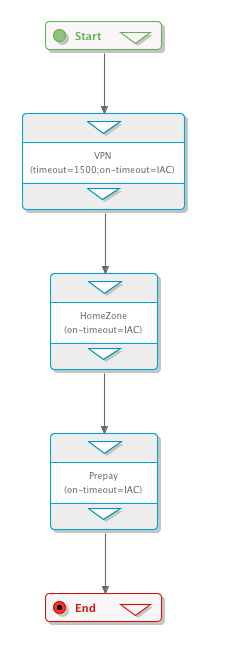A composition service is invoked using an <invoke> element.
Below are possible attributes and child elements for an <invoke> element, plus an example script and diagram:
Example
The following script invokes composition services using the <invoke> element with different options. The first service (VPN) will use a timeout value of 1500 ms; the second service (HomeZone) will use all the defaults; and the last service (PrePay) is so important that if it times out, the processing of the service composition will be terminated.
Attributes and child elements
Below are possible attributes and child elements for an <invoke> element
Attributes
| Name | Description | Optional? | ||
|---|---|---|---|---|
service |
The service to be invoked. Must refer to a service defined in the SIS (using a service reference). |
✘ |
||
timeout |
Specifies the timeout period, measured in milliseconds, that the SIS will wait for a response from the service when required. If present, this timeout overrides the default timeout configured for the service. |
✔ |
||
on-timeout |
Specifies the behaviour the SIS will take if a service response timeout (or other service failure) occurs at any time for the invoked service. The supported values for this attribute are:
The default value if this attribute is not specified is |
✔ |
Child elements
| Name | Description | Optional? |
|---|---|---|
service-input-interceptor |
A service input interceptor. The SIS evaluates this input interceptor before it delivers any event to the service. |
✔ |
service-output-interceptor |
A service output interceptor. The SIS evaluates this output interceptor whenever the service generates output intended for the network. |
✔ |
terminate |
This element can only be specified if the |
✔ |
message-handling-options |
This element specifies configurable options for how the SIS manages specific messages received from the service. |
✔ |
extension-options |
Specifies arbitrary extension options supported by the SIS for service invocation.
This is a collection of |
✔ |

